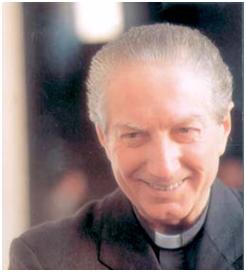As the Synod of the Family is underway in Rome (October 2014), perhaps the words of Cardinal Martini should be remembered by all the Bishops in an interview just before his death:
“Our culture has aged, our churches are big and empty and the church bureaucracy rises up. The Church must admit its mistakes and begin a radical change, starting from the Pope and the bishops. The paedophilia scandals oblige us to take a journey of transformation” (‘ADDIO A MARTINI, “Chiesa indietro di 200 anni”, L’ultima intervista: “Perché non si scuote, perché abbiamo paura?” Corriere della Sera, 1 Settembre 2012)
Like Pope Francis, Cardinal Martini was a man who was in touch with ordinary people.
Carlo Mario Martini was born in Turin in 1927, he joined the Jesuits at the age of 17 and was ordained 8 years later. Carlo Martini was primarily an academic, a world renowned biblical scholar and later Rector of the Pontifical Gregorian University. In 1979, Pope John Paul II appointed Martini as Archbishop of Milan, one of the largest diocese in the world, a post which he held until he retired in 2002. Martini became a cardinal in 1983. For several years after his retirement, Martini battled with Parkinson’s disease, the same illness that incapacitated PopeJohn Paul.
Controversy
Cardinal Martini was regarded by some as a liberal (and therefore, it is sad to say, suspect). However, I found that he spoke with a great deal of common sense. For instance, on the debate on where does a human life begin. The absolutist position of official Church teaching is that human life begins at the point of fertilisation. Martini begged to differ, that a distinct human life comes later. As you can see, Martini was verging on the point of heresy against today’s orthodox Catholic teaching.
The reason why the death of Cardinal Martini hit the headlines is because of his last interview recorded just weeks before his death and published the day after in the Italian daily Corriere della Sera, saying “Our culture has aged, our churches are big and empty and the church bureaucracy rises up, our rituals and our cassocks are pompous..”
Martini was a good man, and deserves our prayers. May he rest in peace.
Links
http://www.mmhawkes.co.uk/belief-or-nonbelief-by-carlo-martini-unmberto-eco/
http://www.bbc.co.uk/news/world-europe-19451439
http://www.news.va/en/news/cardinal-carlo-martini-dead-at-85
http://en.wikipedia.org/wiki/Carlo_Maria_Martini

 What are the dividing lines between Catholic Christians and secularists? Eco (author of Name of the Rose) and Cardinal Martini (in the Catholic corner) discuss four issues: abortion, why women cannot be ordained, hope and the future of mankind and the basis of ethics. Perhaps not the burning issues that many today would think need to be answered, but this book was written in the context of the impending millennium where some predicted this would bring in the end of civilisation as we know it. Today the burning issues would be child abuse, homosexuality, Darwinism or even the environment. Perhaps another age (not too long ago) would have included the just war or nuclear weapons.
What are the dividing lines between Catholic Christians and secularists? Eco (author of Name of the Rose) and Cardinal Martini (in the Catholic corner) discuss four issues: abortion, why women cannot be ordained, hope and the future of mankind and the basis of ethics. Perhaps not the burning issues that many today would think need to be answered, but this book was written in the context of the impending millennium where some predicted this would bring in the end of civilisation as we know it. Today the burning issues would be child abuse, homosexuality, Darwinism or even the environment. Perhaps another age (not too long ago) would have included the just war or nuclear weapons.